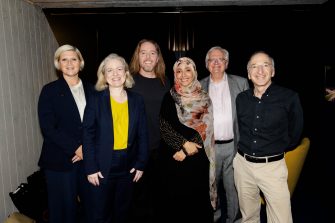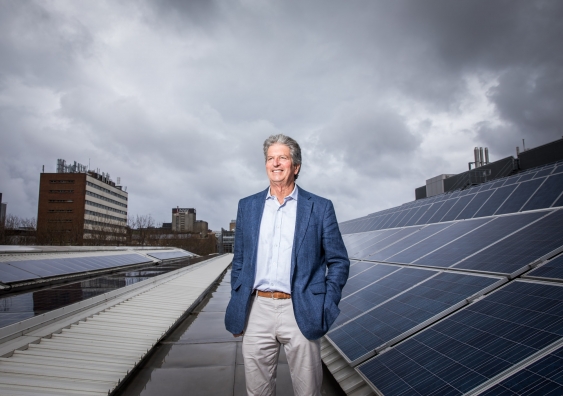Three Nobel Laureates and Tim Minchin discuss the future of decision-making
2024-11-15T14:29:00+11:00

Sandra Brandin, Verity Firth, Tim Minchin, Tawakkol Karman, Professor Brian P. Schmidt and Professor Saul Perlmutter.
Photo: MARIA BOYADGIS
What do two astrophysicists, a human rights activist and composer Tim Minchin all have in common? Quite a lot, as it turns out, as the Nobel Dialogue came to UNSW Sydney.
It’s rare to come across one Nobel laureate. But to see three of them share a stage is another thing entirely.
That’s what audiences at UNSW’s Clancy Auditorium were treated to, as the Nobel Dialogue arrived in Sydney for its first ever Australian event.
The Nobel laureates on stage were astrophysicists Professor Saul Perlmutter and Professor Brian Schmidt, who separately and simultaneously discovered that the universe is expanding at an accelerating rate. They were also joined by Peace laureate Tawakkol Karman who led protests in Yemen during the Arab Spring, as well as musician and composer Tim Minchin.
The topic for discussion was the art of good decision making. Owen Gaffney, chief impact officer at Nobel Prize Outreach, gave a sense of the scale of the issues at stake.
“Decision-making is our superpower, we can cooperate and come together on these vast scales,” he said.
“This has created this incredible world around us. But somehow the problems keep getting bigger too. The risks of nuclear war, climate change, water resources, misinformation, disinformation. Now we have artificial intelligence and the risks and opportunities that come with that.”
Saul Perlmutter, whose Nobel Prize-winning discovery took decades to figure out, said there is an expectation that big problems can be easily and quickly fixed.
“There is a tendency to think that, ok we have a problem, can someone tell us how to solve it and then we are done?” he said.
“I think any problem worth being solved is worth a lot of thought.”
He also stated that scientists like him work with uncertainty all the time, but that society has grown increasingly uncomfortable with ambiguity.
“We should not treat the world as if every factual question is something that is either true or false,” he said.
“We have come to understand that you almost never know whether something is absolutely true or absolutely false and there is a huge amount of information in everything in between.”
Musician and composer Tim Minchin, who was sitting alongside Prof. Perlmutter, agreed uncertainty needs to be valued.
“Most of us are wrong a lot of the time,” he said.
“I talk about humility across all things. If you study philosophy or psychology or anthropology, the deeper you go the more you find humility.”
He argued that empathy – rather than certainty – is key for society to advance.
“I need to stand in the shoes of someone with whom I disagree. I have to figure out why they landed there, that is a form of humility. You’re not trying to win but to understand.”
He said we need to be uncomfortable with uncertainty.
“I don’t think we’re evil, and I don’t think we’re good, but I think we have evolved to fear things we do not understand,” he said.
“We have to get through that backwards step if we’re going to get back to thinking globally about how we get along better so that we can together deal with the big problems like AI, nuclear proliferation and climate change which are things that need global solutions.”
Global conflict and the push against democracy
Professor Brian Schmitt spoke of global hostilities, telling the crowd that he fears the proliferation of nuclear weapons both in states that have held the destructive weapons for decades as well as those seeking to access them (including North Korea, Pakistan and India).
“In my opinion, nuclear war ultimately remains at the top of humanity's existential risks list,” he said.
“We need to make it a priority amongst the nations of the world to decrease arsenals, put in place measures that help make sure nuclear weapons are not used by intention or by accident.”
Peace laureate Tawakkol Karman said in her home country Yemen, and most countries in her region, there are major forces pushing back against the revolutions calling for democracy.
“In Arab countries we are surrounded by monarchies that led the counterrevolution.
“Countries such as Saudi Arabia and the Emirates and other authoritarian regimes like Iran, those three countries led the counterrevolution and do not want democracy in our countries.”
But she said she remains hopeful.
“We are now still in the revolution and still sacrificing for freedom, democracy and justice. We will win this battle, absolutely. We did not give up and we will not give up.”
Media enquiries
For enquiries about this story and interview requests please contact Julia Holman:
Tel: 0435 124 673
Email: julia.holman@unsw.edu.au



